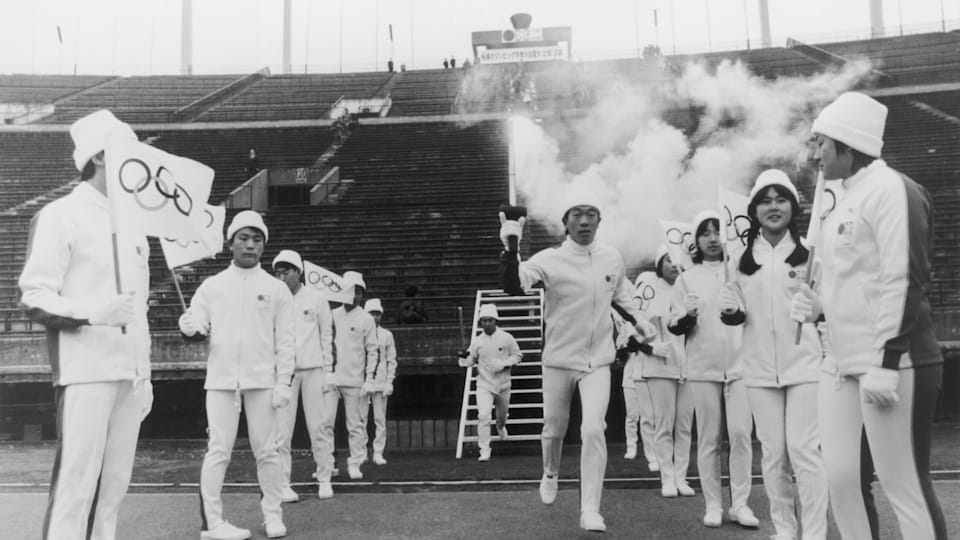Look to the past: Sapporo 1972, the first Olympic Winter Games in Asia
The year 2022 will mark the first Olympic Winter Games in People's Republic of China and the 50th anniversary of the first edition in Asia, Sapporo 1972, in Japan. With less than a month to the quadrennial showpiece, we travel back in time to look at how the Winter Olympic legacy began in Asia.

Half a century ago, the Olympic cauldron was lit for the first time at a Winter Games in Asia. Sapporo 1972 was the first Olympic Winter Games not only in Japan but also in the Asian region. Sapporo, the most northern metropolis of Japan, situated in Hokkaido, welcomed 1,006 athletes from 35 nations. The historic Winter Olympics inspired many Japanese and Asian athletes and has left an indelible legacy.
Celebrating the 50th anniversary, Olympics.com look back to Asia's first Olympic Winter Games.
Hinomaru hikōtai
Winning an Olympic gold medal on home soil is one of the greatest honours for a select few athletes.
At Sapporo 1972, that honour fell upon ski jumper KASAYA Yukio, who claimed a historic victory in the normal hill competition, the first Japanese athlete to win a Winter Olympic gold medal. His compatriots, KONNO Akitsugu and AOCHI Seiji finished second and third to complete a Japanese podium sweep. Their podium dominance captured the imagination of local fans and television viewers across the globe.
Their stunning accomplishment earned the trio the nickname "Hinomaru hikōtai" (the Rising Sun Squadron) and cultivated a love for ski jumping in Japan, inspiring generations to come. HARADA Masahiko followed in their wake, winning gold in the men's large hill team ski jumping competition in Nagano 1998.
ALSO READ: An Olympian explains: How to master ski jumping with Harada Masahiko
Born in the same year as Sapporo 1972, KASAI Noriaki is one of the legends of ski jumping, becoming the first athlete to compete at eight consecutive Olympic Winter Games in PyeongChang 2018. He made his debut in Albertville 1992 before winning his first medal with a silver in the team event in Lillehammer 1994. In Sochi 2014, he clinched the individual Olympic silver on the large hill and bronze in the team event at 41. His passion still burns for a ninth Olympic appearance.
Five decades of sustainability
Infrastructure and Olympic venues were developed in Sapporo ahead of the historic Winter Games in Japan.
Two ski jump platforms, Miyanomori (normal hill) and Okurayama (large hill), have been used not only at Sapporo 1972 but also for world championships and World Cup events in ski jumping, and nordic combined.
Makomanai Park boasts two multi-functional venues – an outdoor and indoor stadium. The outdoor stadium was used for the Opening Ceremony and speed skating 50 years ago. Speed skating competitions are still held during winter and sports such as football, athletics and tennis in the summer months.
The indoor arena is used for both summer (volleyball, judo etc.), and winter sports such as figure skating and ice hockey which were held during Sapporo 1972. The venue can also be used for music concerts and other cultural events.
Watch below how the Makomanai indoor arena transforms into an ice rink.
A year before the Games, the new subway system was opened in Sapporo city. It connected the north with the south to effectively transport the Olympic family and resolve chronic traffic congestion due to heavy snow.
Sapporo left a sustainable legacy 50 years later and earned a reputation as one of the top winter sports destinations attracting local and international guests.
Winter journey continues in Asia
Following the success of Sapporo 1972, Japan also hosted Nagano 1998, which was the second Olympic Winter Games held in Asia. Twenty years after Nagano, South Korea became the second Asian nation to welcome the Olympic Games to the continent with PyeongChang 2018.
What is the next?
Half a century since Sapporo 1972, Beijing will soon welcome Winter Games athletes from across the globe. The Chinese capital will become the first city to organise both the Olympic Winter and Summer Games. Are you ready for the next chapter?
Beijing 2022 will begin on 4 February.
